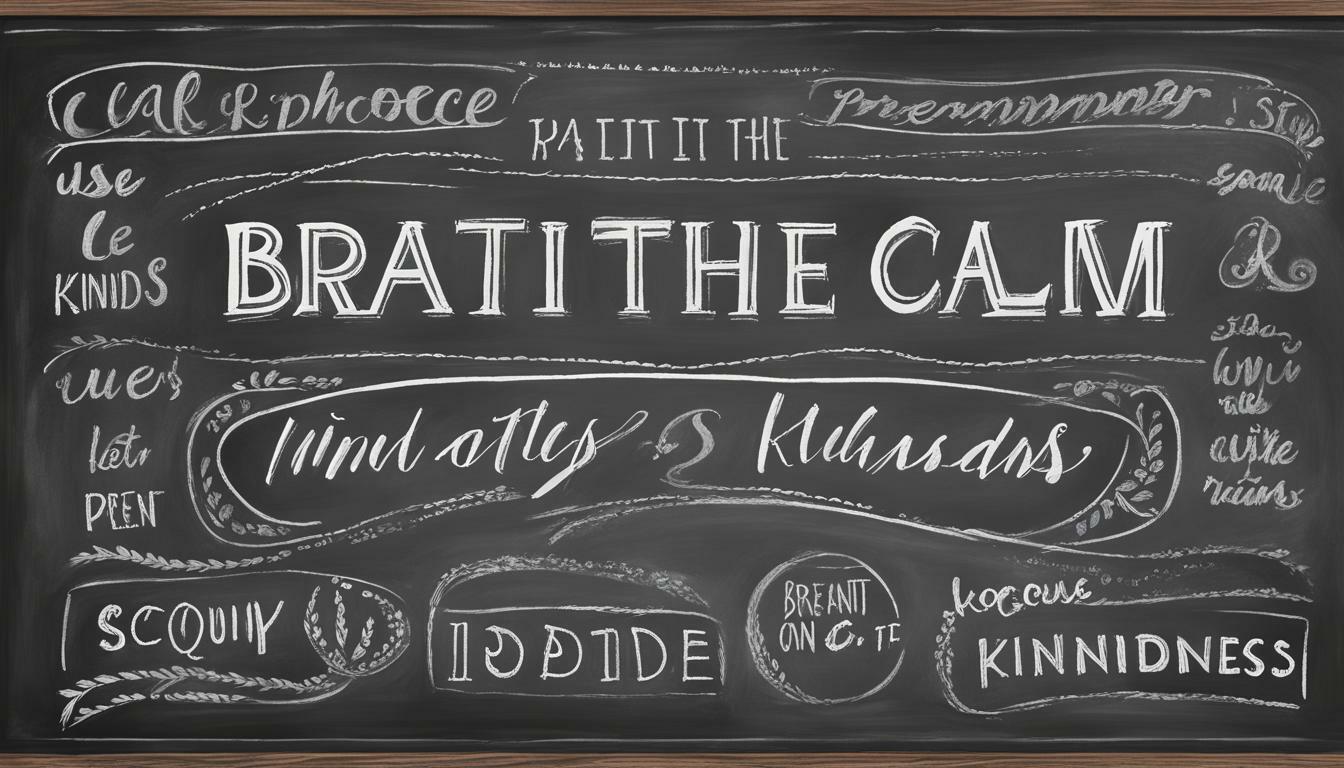Do you struggle with anger? Have you been looking for ways to regain control over your emotions and promote peace of mind? If so, incorporating affirmations into your daily routine can be a powerful tool in managing your anger.
Affirmations are positive statements that can help shift your mindset and promote positivity. By repeating affirmations regularly, you can rewire your brain to think positively and release negative emotions like anger.
Key Takeaways:
- Affirmations can be a helpful tool for managing anger.
- Repeating positive affirmations can help shift your mindset and promote positivity.
- Affirmations can help release negative emotions like anger.
Understanding Anger and Its Effects
As a copywriting journalist, I have come across many individuals who struggle with managing their anger. It’s no surprise that anger can have a significant impact on mental and physical health, relationships, and overall quality of life. At its core, anger is a natural and healthy emotion, but when it becomes overpowering and out of control, it can cause detrimental effects. That’s why learning how to control anger is crucial.
There are various reasons why people experience anger. It can stem from stress, frustration, fear, or feeling threatened. Instead of avoiding or suppressing these emotions, it’s important to identify the root cause of anger and find healthy ways to manage and release it.
Learning anger management techniques can help individuals regain control over their emotions and alleviate the negative effects of chronic anger. These techniques can include deep breathing exercises, physical activity, meditation, or seeking support from loved ones or professionals.
Anger relief affirmations can also be an effective tool in managing anger. By repeating positive affirmations for anger, individuals can shift their mindset from negative to positive, promote peace of mind, and release and let go of anger.
Overall, understanding anger and its effects is the first step towards finding healthy ways to manage and release it. Incorporating anger management techniques and affirmations into daily life can significantly improve mental and physical well-being.

The Power of Affirmations in Anger Management
When it comes to managing anger, the power of affirmations should not be underestimated. Calming affirmations and releasing anger affirmations can help shift your mindset and promote positivity. By regularly repeating these affirmations, you can let go of negative emotions and regain control over your thoughts and feelings.
One of the main benefits of using affirmations for anger management is that they help to calm the mind. When you feel angry, your thoughts are often racing, and it can be hard to focus on anything else. By repeating calming affirmations, such as “I am at peace” or “I am calm and in control,” you can slow down your racing thoughts and regain a sense of calm.
Additionally, releasing anger affirmations can help you let go of negative emotions. When you hold onto anger, it can manifest in physical symptoms such as headaches, stomachaches, and muscle tension. By repeating affirmations that focus on releasing anger, such as “I am letting go of my anger” or “I am choosing to release my anger and move forward,” you can start to release that tension and feel more at ease.

Using affirmations for anger management is simple yet powerful. Start by choosing a few affirmations that resonate with you and write them down. Repeat them regularly throughout the day, either silently to yourself or out loud. You can also incorporate them into your meditation or mindfulness practices.
Remember that affirmations are just one tool in your anger management toolbox. It’s important to also incorporate other techniques, such as deep breathing exercises, physical activity, and seeking support from loved ones or professionals. With time, patience, and consistency, you can learn to manage your anger and live a more peaceful life.
Creating Effective Affirmations for Anger
Now that we understand the power of affirmations for anger management, it’s time to create our own. An effective affirmation is one that resonates with you and feels true to your experience. Here are some tips to get started:
- Use present tense: Write your affirmations as if they’re already true. For example, “I am calm and in control” instead of “I will be calm and in control.”
- Keep it positive: Use positive language instead of negative. Instead of “I am not angry,” try “I am at peace.”
- Personalize: Make your affirmations specific to your needs. For example, “I release anger easily and effortlessly” or “I trust in my ability to manage my emotions.”
Remember to write your affirmations down and repeat them regularly. You can say them out loud, write them in a journal, or display them in a place where you’ll see them often. The more you repeat them, the more they’ll become ingrained in your subconscious mind.

Incorporating affirmations into your daily routine can help you stay on track with your anger management goals. Try saying your affirmations first thing in the morning or before bed. You can also repeat them during meditation or any quiet moment of your day.
With consistent practice, affirmations can become a powerful tool in managing anger and promoting greater peace of mind. Take the time to create affirmations that feel true to you and make them a part of your daily routine. You deserve to feel calm, in control, and at peace.
Incorporating Affirmations into Daily Life
To effectively manage anger using affirmations, it is important to incorporate them into your daily routine. Here are some stress management techniques that can help:
- Set a time every day to say your affirmations. This could be in the morning before starting your day or at night before going to bed.
- Place visual reminders of your affirmations around you. This could be a sticky note on your mirror or a desktop background on your computer.
- Combine affirmations with mindfulness or meditation practices. Say your affirmations during deep breathing exercises or visualization techniques.
By incorporating affirmations into your daily life, you are reminding yourself of your commitment to managing your anger and promoting peace of mind. Consistency is key in building new habits, so make sure you repeat your affirmations regularly.
 Remember, managing anger is a journey, and it takes time and effort. Be patient with yourself as you work towards your goals, and always practice self-compassion and self-care.
Remember, managing anger is a journey, and it takes time and effort. Be patient with yourself as you work towards your goals, and always practice self-compassion and self-care.Additional Techniques for Anger Management
While affirmations can be a powerful tool for managing anger, it’s important to have a range of techniques at your disposal for when intense feelings arise. Here are some additional methods to consider:
- Deep breathing exercises: Taking slow, deep breaths can help calm your nervous system and reduce feelings of anger. Try inhaling for a count of four, holding for a count of four, and exhaling for a count of six.
- Journaling: Writing down your thoughts and feelings can help you process them and gain a new perspective. Use a journal to track triggers for your anger and your reactions to them.
- Physical activity: Exercise can serve as a healthy outlet for anger and release tension in the body. Take a walk, go for a run, or try a kickboxing class.
- Seeking support: Sometimes it can be helpful to talk to a trusted friend, family member, or mental health professional about your anger. Seek out support when you need it.
- Practicing self-care: Prioritizing self-care activities like getting enough sleep, eating well, and engaging in activities you enjoy can help reduce stress and prevent anger from building up.
Remember, managing anger is a process that takes time and practice. Be patient with yourself as you explore different methods that work for you. With consistency and commitment, you can learn to manage your anger in healthy ways that promote wellbeing and peace of mind.

The Power of Affirmations for Anger Management
Managing anger can be a challenging and emotional process. Navigating through those feelings can be daunting, and it can be difficult to find healthy ways to release and cope with anger. The good news is that positive affirmations, when used consistently and repeatedly, can be a powerful tool in helping individuals regain control over their emotions and promote inner peace.
Affirmations are short, positive statements that help shift our mindset and promote positivity. They can be repeated silently or aloud, and they are most effective when said with intention and belief. When it comes to managing anger, affirmations can help individuals release and let go of their emotions in a healthy and constructive manner.
The Benefits of Affirmations for Anger Management
Using affirmations for anger management can have numerous benefits. Affirmations can help individuals:
- Shift their focus away from negative thoughts and emotions
- Promote self-awareness and self-compassion
- Encourage a positive outlook and reduce stress
- Promote a sense of calm and inner peace
When used in conjunction with other stress management techniques, affirmations can be a powerful tool in helping individuals manage their anger in a healthy and constructive manner.
Creating Effective Affirmations for Anger
Creating your own affirmations can feel daunting at first, but it is a simple process. When creating affirmations for anger management, use present tense and positive language. It’s also important to personalize affirmations to suit individual needs and goals.
For example, you might say: “I release anger easily and effortlessly” or “I am calm and peaceful in all situations.” Write down your affirmations and repeat them regularly throughout the day, especially when you feel angry or stressed.
Incorporating Affirmations into Daily Life
Consistency is key when it comes to using affirmations for anger management. Incorporating affirmations into your daily routine can help make them a habit.
You might try incorporating affirmations into your morning or bedtime routine, using visual reminders such as sticky notes, or incorporating them into meditation or mindfulness practices. The more you use affirmations, the more effective they can be in helping you manage your anger.
Additional Techniques for Anger Management
Affirmations can be a powerful tool in managing anger, but they are most effective when used in conjunction with other stress management techniques. Deep breathing exercises, journaling, physical activity, seeking support from loved ones or professionals, and practicing self-care can all be helpful in managing anger. It’s important to find what works for you and to be patient and consistent in your practice.
Conclusion
Managing anger can be a challenging process, but using affirmations for anger management can be a powerful and effective tool in promoting inner peace and reducing stress. Remember to be patient and consistent in your practice, and to incorporate affirmations into your daily routine. With time and practice, you can learn to manage your anger in a healthy and constructive manner.
Can Positive Affirmations Help Teen Girls Manage Their Anger?
Positive affirmations have been proven effective in boosting teen girl confidence, and they can also help manage their anger. By repeating empowering statements like I am capable of handling my anger calmly, young girls can develop a more positive mindset and better coping mechanisms. Regular use of affirmations can contribute to emotional stability and a healthier expression of emotions.
FAQ
Q: How can affirmations help with anger management?
A: Affirmations can help individuals regain control over their emotions and promote peace of mind. By repeating positive statements, individuals can shift their mindset and promote positivity, which can help in releasing and letting go of anger.
Q: What are some common anger management techniques?
A: Some common anger management techniques include deep breathing exercises, journaling, physical activity, seeking support from loved ones or professionals, and practicing self-care.
Q: How can I create effective affirmations for anger management?
A: To create effective affirmations for anger management, use present tense, positive language, and personalize them to suit your individual needs. Write them down and repeat them regularly to reinforce positive thinking.
Q: How can I incorporate affirmations into my daily life?
A: You can incorporate affirmations into your daily life by including them in your morning or bedtime routines, using visual reminders, or incorporating them into meditation or mindfulness practices. Consistency and repetition are key.
Q: Are there additional techniques for anger management?
A: Yes, in addition to affirmations, you can try deep breathing exercises, journaling, engaging in physical activity, seeking support from loved ones or professionals, and practicing self-care as additional techniques for anger management.





